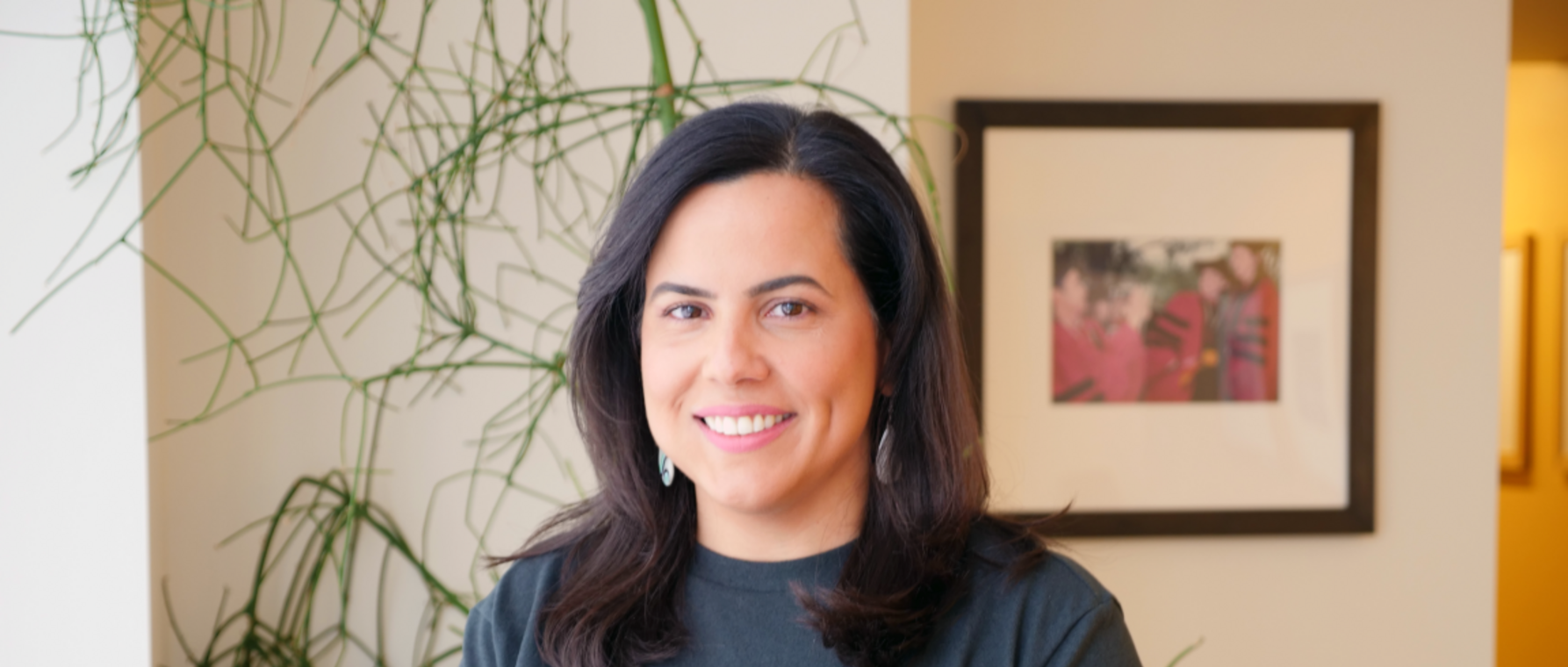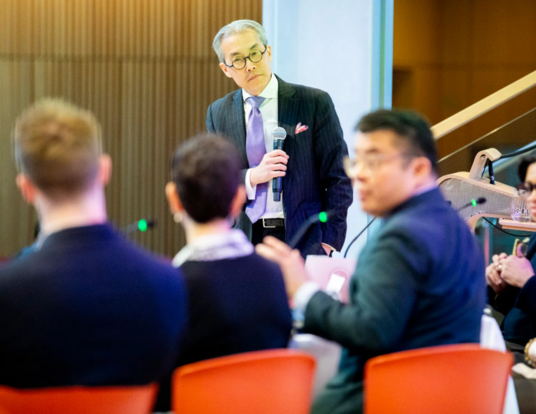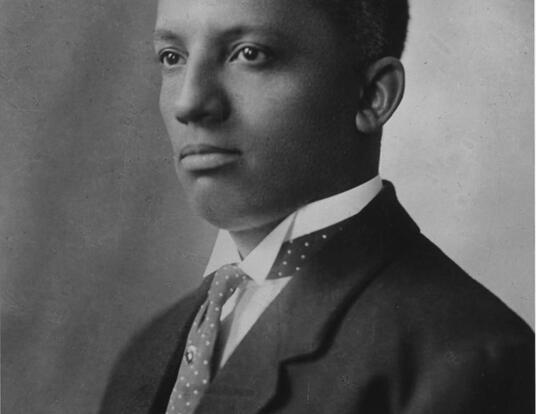To Succeed and Thrive
New director of EDIB wants to ensure that all Harvard Griffin GSAS students flourish

Dr. Gisselle Velez-Ruiz, the new director of equity, diversity, inclusion, and belonging (EDIB) at the Harvard Kenneth C. Griffin Graduate School of Arts and Sciences (Harvard Griffin GSAS), brings over a decade of experience to the position—most recently at the Broad Institute of MIT and Harvard. There she led the Office of STEM Engagement and Inclusion (OSEI) in developing, implementing, and assessing evidence-based programming designed to support students (K-12 through the postbaccalaureate) from marginalized backgrounds to enter and succeed in STEM careers.
At Harvard Griffin GSAS, Velez-Ruiz will develop strategic initiatives to support an equitable, diverse, and inclusive environment for students and enhance efforts to recruit and retain members of minoritized groups.
The School’s Office of Communications spoke recently with Velez-Ruiz about her experience and background; the ongoing importance of diversity, equity, and inclusion; and her hopes for advancing EDIB at Harvard.
Can you say a little about your background? How did you come to EDIB work?
I was born and raised in Puerto Rico. My siblings and I were the first in our family to obtain a college degree. My parents worked really hard to provide opportunities they didn’t have access to and always emphasized the importance of education. They were always pretty vocal about how important education was and pushed me and my siblings to do well. When it was time for college, they sacrificed so we could go to school.
When I started college, I didn't have any career guidance outside of being a medical doctor or a lawyer. I was good at math, but I didn't know you could do anything with it. I gravitated to chemistry by meeting faculty who saw potential in me and reached out. There were some programs on campus for students of color and I started learning about research careers. I got to meet other faculty. I got to talk to people who could help me identify graduate programs and do research.
I left my home in Puerto Rico and went to the University of Michigan for my PhD. It was great but it was really hard. In most classes, I was the only person of color in the room. The coursework was challenging so was the new environment—especially the winters—and being far away from my family. I was on the receiving end of microaggressions. Classmates made comments that I only got into my program because of affirmative action.
Fortunately, I was able to find on- and off-campus resources and support. In organizations that were established and run by students of color, I found a community of people with whom I could learn, vent, and celebrate. Throughout graduate school and my postdoc, I always volunteered for outreach programs in schools, served as a mentor, and offered to talk to incoming students because I wanted to give back. I realized over time that that was what I wanted to do for a career.
Today, I bring all that personal experience to the work I do—opening doors, creating a space where all students feel welcome, and giving them the tools to help them thrive. Nobody told me how to do it. I had to learn by observing. I want to share that knowledge with students to support their commitment to—and success in—graduate studies. That often means helping them learn the “unwritten curriculum” that enables them to navigate the frequently unspoken standards and norms of higher education.
There's been a lot of misinformation and distortion in recent months about diversity, equity, and inclusion (DEI) efforts on university campuses. What is DEI? And what is it not?
DEI is about making sure everybody gets a voice and a seat at the table; it’s not about removing anyone.
Institutions like Harvard were established long ago. Their communities have changed over time—different students with different backgrounds, identities, and experiences—but the institutions haven’t adapted at the same rate. Those spaces can be hard to navigate for members of groups who have historically been excluded or made to feel unwelcome. So, DEI is the work that helps us make Harvard a place for all. That’s the goal toward which we are all working.
Why is EDIB important?
It’s important because, although there is talent everywhere, opportunities are limited and often reserved for certain groups. EDIB work allows us to remove barriers and create opportunities, access, and progress toward social justice; it creates a space for self-reflection and accountability; it helps us recognize our own privilege and positionality; it fosters understanding and enables us to be open to working with others.
There’s a lot of research on the impact of EDIB initiatives on recruitment, retention, innovation, and team performance as well as on children, teenagers, etc. But, ultimately, EDIB is inseparable from our dedication to academic excellence and our commitment to educating visionary scholars, innovative educators, and creative leaders for the world.
How did you put these principles into action at the Broad Institute and the University of Michigan?
At Broad and Michigan, I partnered with staff and faculty to use evidence-based interventions to create environments that enabled students with traditionally marginalized identities to feel part of the community. That took different forms. At the Broad Institute, it involved thinking of different academic stages—from K-12 to undergraduates and postbaccalaureates—considering where students were in their educational training and how we could connect what they were learning to the research being done at the Broad—not only what the researchers did but also how it impacted the students’ lives and society. We implemented summer research programs for high school students, created a coding club that allowed middle school students to understand how computer science could be used in biology, and brought scientists to the classroom to talk about their work and who they were as people.
At Michigan, I got to work with faculty and students from the humanities and social sciences, learning how funding sources and research methods were different from the natural sciences—as were the needs of students with diverse identities, backgrounds, and experiences. We also developed programming to support students with children, military veterans, and those faced with financial instability. We tried to provide resources, support, and programming so these students could fully immerse themselves in research.
Finally, how do you hope to advance EDIB priorities at Harvard Griffin GSAS?
First and foremost, I want to continue to learn, support, and elevate all the hard work that Dean Sheila Thomas and the Office of EDIB have been doing. Next, I want to take time to listen to students and faculty to better understand the areas of need. What can we do to strengthen their ability to have difficult conversations? Also, we need to create spaces for healing—particularly now.
Fostering a community where students feel welcome has to be done by iteration—getting feedback, revising, and implementing. We need to listen always because things change, things evolve. We also need to give students space to feel and process in a way that makes sense to them because everybody's different.
Above all, the thing I'm committed to is helping students, faculty, and staff strengthen and develop the ability to have constructive conversations across differences and to feel that they are truly a part of this community. That’s what guides me. The need is urgent, but we can’t rush the process. We have to be thoughtful about what we do and why we do it, which in a way can create a sense of fear. That's going to be the challenge—to push past that fear and remember that slow and steady wins the race. Ultimately, we want to create profound and lasting change that will allow us to foster and benefit from a diverse campus community.
Get the Latest Updates
Join Our Newsletter
Subscribe to Colloquy Podcast
Simplecast





